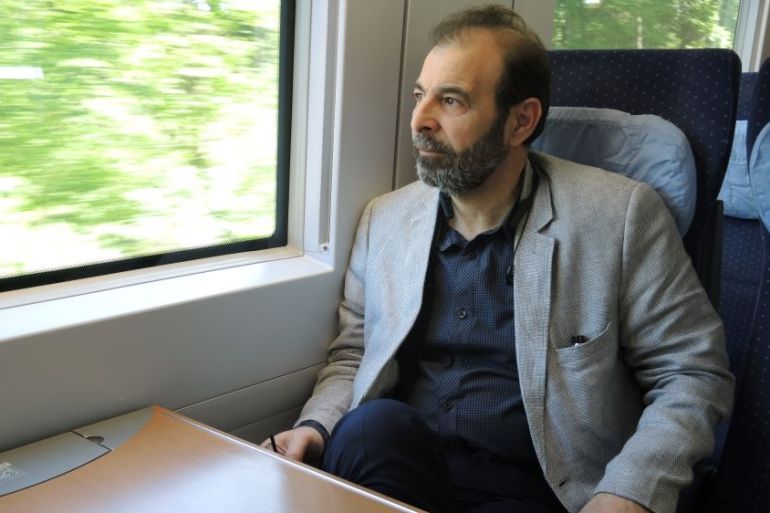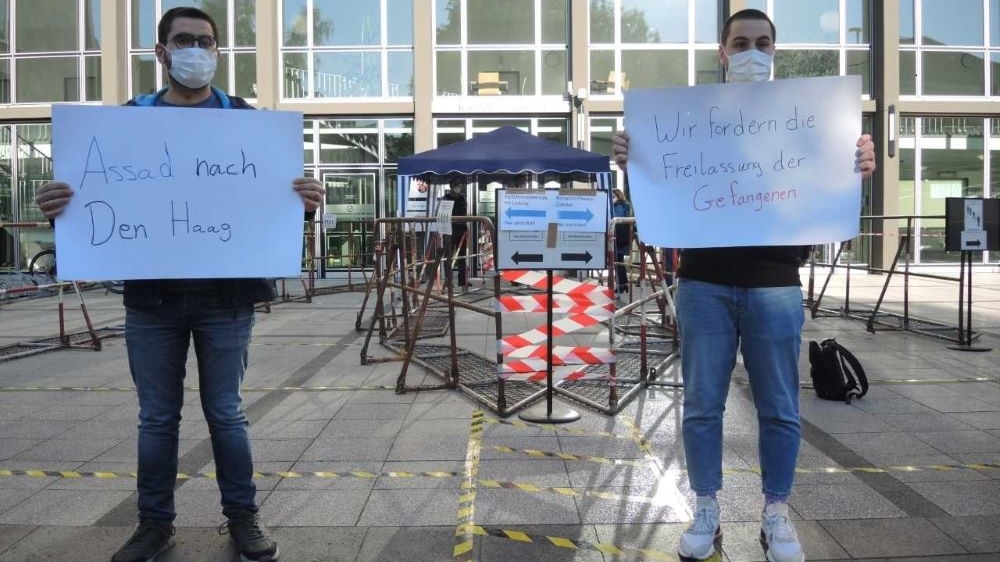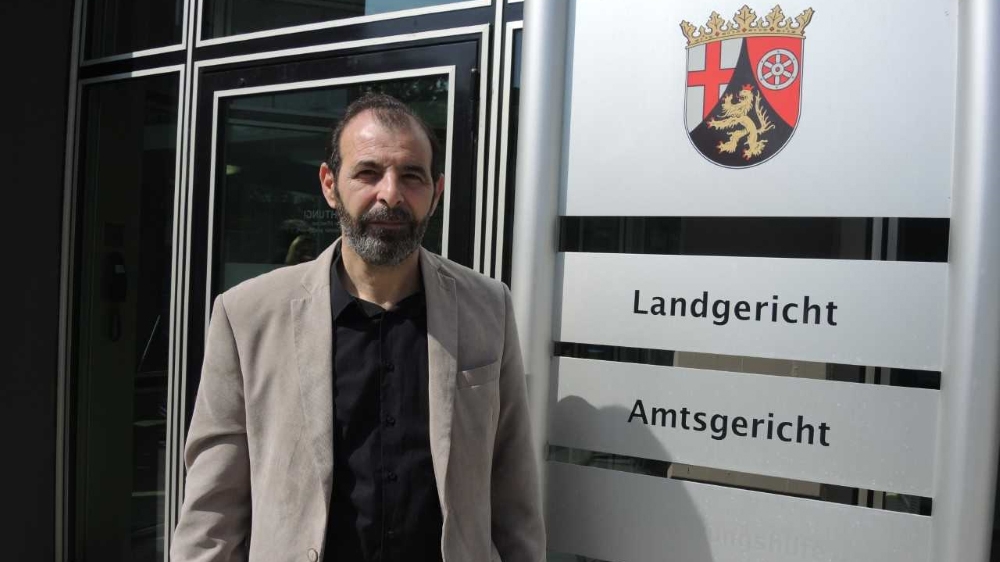Syria’s long road to justice and the man hoping to walk it there
Anwar al-Bunni has helped make a landmark trial possible, but his sights are set on a bigger target – the Syrian regime.

It is 10:30am on April 22; a sunny Wednesday morning.
Anwar al-Bunni, a 61-year-old with small dark eyes beneath bushy brows, is standing outside Berlin Hauptbahnhof, the German city’s main train station, in a light grey jacket and dark pants. Where travellers and commuters usually hurry in and out of the large glass and steel building, all is quiet today. Whoever can, is staying at home because of the coronavirus.
Keep reading
list of 4 itemsAustralian war crimes whistleblower David McBride jailed for six years
Will Israel’s war on Gaza sway South Africa’s election?
Masked Tunisian police arrest prominent lawyer for media comments
Al-Bunni calmly picks a cigarette from a silver case and lights it. There is still enough time for a smoke before the train that will take him 600km (373 miles) to the western German city of Koblenz is due to depart.
The renowned Syrian human rights lawyer is making his way to Koblenz’s Higher Regional Court, where he will testify in a case due to begin the next day. But al-Bunni is more than just a witness at the trial. He is, many of those connected to the trial agree, one of the people who made it possible.
4,000 cases of torture, 58 deaths
In the landmark trial, Anwar Raslan and Eyad al-Gharib – alleged members of Branch 251 of the Syrian military intelligence service in Damascus – stand accused of committing crimes against humanity.
The accusations against al-Gharib relate to the brutal assault and torture of 30 anti-government demonstrators he allegedly rounded up in the autumn of 2011.
But it is Raslan’s case that is seen as the most significant. The former senior military official stands accused of being the head of Branch 251’s investigations and thereby responsible for at least 4,000 cases of torture, 58 deaths and two cases of rape or sexual assault between April 2011 and September 2012. If found guilty, he could receive a life sentence.
Both men ultimately defected – Raslan in 2012 and al-Gharib in 2014. They fled Syria and started new lives in Germany – where they were arrested in 2019.
Since 2011, when protests against Syrian President Bashar al-Assad’s government broke out, the German Federal Prosecutor has been collecting evidence about crimes committed in Syria.
Now, it is using the principle of universal jurisdiction to hold the world’s first criminal trial on torture in Syria.
The German Code of Crimes against International Law, implemented in 2002, allows the German authorities to prosecute anyone who commits crimes against humanity, even if they have no direct connection to Germany.

Exposing the Syrian regime
The train carriage is almost empty as al-Bunni takes his seat in it. Travelling with him is a Syrian survivor of torture, her mother and a Syrian journalist.
Concealed behind sunglasses, the young woman, who asked to remain anonymous, is on the verge of tears.
“This man has been looking after me like a father,” she says. “He is the only one who is really on our side.”
Like tens of thousands of Syrians, she was tortured in al-Assad’s notorious prisons, where she was detained for about a year in 2012.
Now a refugee in Germany, she has not recovered from the physical and psychological damage done to her. Despite several operations, her kidneys are still seriously damaged and she needs psychotherapy. “I really want to support the trial by testifying,” she says. “But I cannot speak about the details of what they did to me.”
As important as this trial is, according to al-Bunni, it is just the beginning of Syria’s long road to justice, at the end of which may stand the prosecution of al-Assad himself.
“We already submitted a lawsuit against him to the German Federal Prosecutor in 2018,” he explains. “The evidence heard at the trial in Koblenz will support our case against al-Assad by exposing the whole Syrian regime.”
Becoming a lawyer
It has been a long time coming for al-Bunni, who began defending political prisoners in Syria in 1986.
All together, my siblings and their spouses have spent almost 70 years in Syria's prisons.
He was born and raised in Hama in a family that gave him every reason to become a lawyer.
“All together, my siblings and their spouses have spent almost 70 years in Syria’s prisons,” he laughs.
But, al-Bunni actually started his working life doing something entirely different. In the early 1980s, he was an assistant engineer on the construction of Saydnaya Prison, a place Amnesty International labelled a “human slaughterhouse” in 2017 because of the mass executions of prisoners that have taken place there.
But at the age of 21, after three of his siblings were arrested, he decided to return to university to study law.
His oldest brother was the first to be detained in 1977; others followed.
“My brothers and sisters as well as many of my friends were political activists. I was not, so I decided to become a lawyer: at least I would be able to contribute by defending them,” he explains.
Arbitrary arrests of political activists and opposition members, like torture, was commonplace under the rule of Bashar al-Assad’s father, Hafez al-Assad.
Al-Bunni spent almost 20 years defending Syrian inmates: political prisoners pro bono, criminals to make a living.
Finally, in 2006, he, too, was arrested. He was sentenced to five years in prison for spreading seditious false news.
“The prison guards tried to kill me twice, but I survived with the help of other inmates,” he recalls. “I tried to make the best of my time there. I started working out and devised plans for Syria’s political future that I later wrote down and published.”
In 2011 he was released, just in time to see the first months of Syria’s uprising.
In 2014, however, he fled from Syria to Lebanon, where he and his family received humanitarian visas from the German embassy.
“I wanted to stay in Syria as long as possible to defend the increasing number of political prisoners,” he says. “But at some point it became clear that being arrested was tantamount to death. Not just one’s own death, but the death of the whole family. So we left.”
The link
In Germany, al-Bunni founded the Syrian Center for Legal Studies and Research, where he and his colleagues collect information about Syrian regime members and build cases around them.
Even though he is not licensed to work as a lawyer in Germany, he has cooperated with the European Center for Constitutional and Human Rights (ECCHR) to prepare lawsuits and put the German prosecution in touch with many witnesses.
Their statements give detailed accounts of Syria’s detention centres and what happens inside them. They are among the most important pieces of evidence in this groundbreaking case.
Many of the witnesses knew al-Bunni from Syria, where he had already defended them during their detention. Others have met him in Germany, where a large Syrian exile community has formed since around one million refugees arrived in 2015.
Because al-Bunni is well known and trusted within the community, he and his fellow activists were able to locate former inmates and torture survivors in Germany and encourage them to testify with the Federal Prosecution.
“He is of great value to our work,” explains Patrick Kroker, one of the lawyers at ECCHR who are representing the Syrian plaintiffs at the trial.
“He has an incredibly large network and standing among the Syrian community. He and other Syrian lawyers such as Mazen Darwish and Jumana Saif have been the link between the Syrian witnesses and the German judiciary.”
A small cog
As the high-speed train rushes past green meadows, wheat fields and forests, al-Bunni gives one media interview after another. He says he does not mind; on the contrary, he is delighted by all the media attention the trial has received across the world.
“The media is our strongest weapon,” he says. “The whole world needs to understand that these people can never play a part in Syria’s future.”
In English and Arabic, he patiently answers the same questions over and over again: Yes, it is true that he ran into the accused Anwar Raslan a few years ago at the refugee accommodation centre in Berlin Marienfelde. Yes, he did recognise him as the man who had arrested him in 2006. No, this trial is not his own personal vendetta against him. It is much bigger than that.
“He arrested them, tortured them, killed them under torture,” al-Bunni almost shouts into his phone during one interview about Raslan.
After hanging up, he smiles apologetically, and looks around to see whether he has bothered other passengers. Then he explains: “Our goal is not to convict a small cog of the infernal machinery that continues to murder people. Instead, we want to use this small cog to prove the existence of the machinery and to show the extent of its infernality.”
Al-Bunni has had to explain many times why he is backing the trial. He has been criticised for it, even by friends and colleagues who believe that putting two defectors on trial, while high-ranking Syrian officials are still free, is the wrong approach.
Justice must always be served in accordance with the needs of the victims, not the perpetrators.
For al-Bunni, however, it makes no difference, whether or not they defected.
“In Islam we have this principle that whoever becomes a Muslim is absolved of any sins he may have committed before,” he explains. “But justice does not work like that outside of religion. Just because they defected, they cannot be considered innocent. Justice must always be served in accordance with the needs of the victims, not the perpetrators.”
Several victims will participate as joint plaintiffs in the trial against Raslan. This allows them to play a more active role in shaping the trial instead of just testifying once in front of the court. They can attend every hearing, summon witnesses and file motions.
Others who were incarcerated and tortured in Syria will testify like al-Bunni or attend the hearings as spectators.

Beating, beating, beating
At 6:30am on April 23, the first day of the trial, a long line has formed outside the court building in Koblenz, stretched even longer by somewhat observed social distancing rules. Compared to Koblenz’s main court building with its castle-like towers and arched windows, this one is an unremarkable block with eight floors of square windows. But it has a large room suitable for the public interest in this historical trial.
Journalists and prominent members of the Syrian exile community are queuing for the limited seats in the courtroom, due to social distancing measures implemented during the coronavirus pandemic.
Al-Bunni is not among them. He will not be allowed to attend any hearings, since he himself will be called to give evidence as a witness in due time. As a prominent human rights lawyer in Syria and a former prison inmate, he will give the judiciary insight into the system of arbitrary arrests and inhumane prison conditions of his home country.
Usually, when violent conflicts end the winner sets the framework for transitional justice. But in this case justice is served while the crimes continue to be committed.
But before he is called, he will be waiting outside the court to meet the other witnesses and plaintiffs after the hearing – to support them and hear all about what happened inside.
They will tell him how the two defendants were led into the courtroom for the first time: how al-Gharib hid his face from the cameras behind the hood of his jacket while Raslan’s uncovered face showed no emotion; how the federal prosecutor read the indictment, including a long list of the witnesses’ accounts of torture – of electric shocks, sleep deprivation and beating, beating, beating – with batons, plastic hoses or frayed power cables that inflicted deep wounds into their skin.
Al-Bunni hopes the trial will be the first step towards change.
“Usually, when violent conflicts end the winner sets the framework for transitional justice,” he says, after the first two trial days have ended and he is again on the train, back to Berlin for the weekend.
“But in this case, justice is served while the crimes continue to be committed. Justice will set the framework for how the conflict in Syria will develop.”
This trial is just one element of that. Syrian activists and NGOs across Europe have prompted their federal prosecutors to issue international arrest warrants against the highest-ranking members of the Syrian regime.
It will take patience to see the results, but right now Anwar al-Bunni is optimistic.
“I had no doubts that this moment would come,” he says. “But this trial is not our final goal. It is just one step on the way to bringing all criminals to justice.”